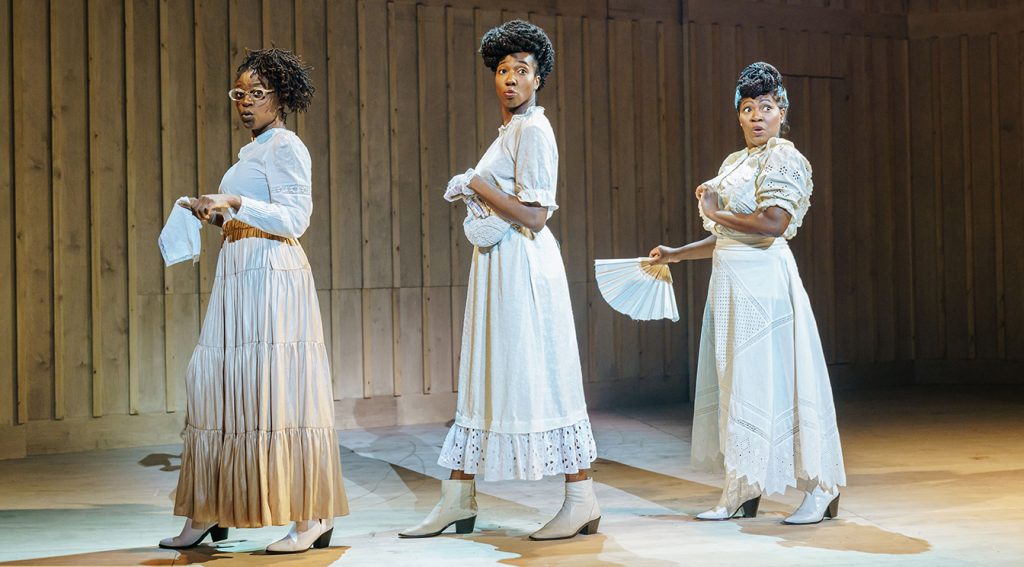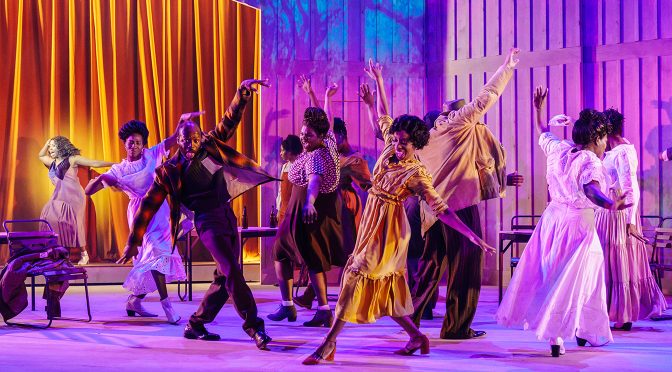In his introductory remarks to this new online version of a 2019 revival staged with the Birmingham Hippodrome, the Curve’s artistic director Nikolai Foster hopes the production inspires and uplifts the audience. Taking on the task, director Tinuke Craig has achieved exactly that – 100 per cent!
Adapted from Alice Walker’s novel, the Tony award-winning musical sounds fantastic. The singing here is superb, and the score, from Brenda Russell, Allee Willis and Stephen Bray, is interesting and intelligent. Staged in the round, the play’s sensitive filming allows us to take in strong acting and appreciate Mark Smith’s choreography. Craig combines all this to give us “a story to believe in” that won’t leave a dry eye in your house.
The lead characters, with their difficult lives, aren’t easy to portray. Celie’s self-sacrifice, as her children are taken from her and she endures horrific domestic abuse, is hard to watch. But, taking the role, T’Shan Williams expresses pain and anger through song with incredible power – the range in her singing is awe-inspiring. Celie’s whip-wielding husband, Mister, is relentlessly awful, with Ako Mitchell suitably repellent in the role. Casting vanity aside, his redemption is a strong companion to Celie’s. In the scene of Mister’s breakdown, Mitchell has a raw power that is breath-taking.

While Celie’s life is full of trauma, there’s humour in The Color Purple. Plenty comes from the gossiping church ladies, a brilliant trio performed by Rosemary Annabella Nkrumah, Danielle Kassaraté and Landi Oshinowo, who have some of the most adventurous musical moments. And while the story of Celie’s stepson and his wife Sophia is troubled, their relationship contains laughs as well as passion and is portrayed marvellously by Simon-Anthony Rhoden and Karen Mavundukure – I could have watched both all night.
Handling relief in such a powerful story is tricky. But the show needs light… and colour. This is most clearly revealed in the joy that surrounds the character of Shug Avery. With yet another magnificent performance, from Carly Mercedes Dyer, the blues singer who both Mister and Celie fall in love with becomes a sage who holds the key to Celie’s future. Dyer’s portrayal convinces, while her powerful singing commands. And Shug and Celie have one of the best love songs there is.
The finale reveals how well structured the show is, Marsha Norman’s book prepares us for emotion and T’shan Williams excels in delivering it. It is Celie’s journey of self-discovery that makes the show so powerful. I had goosebumps for the last 20 minutes. Acknowledging the beauty in herself and the world, Celie comes to accept her sexuality and her religion in an inspiring and uplifting fashion that, fittingly, ends with a prayer.
Until 7 March 2021
Photos by Manuel Harlan

